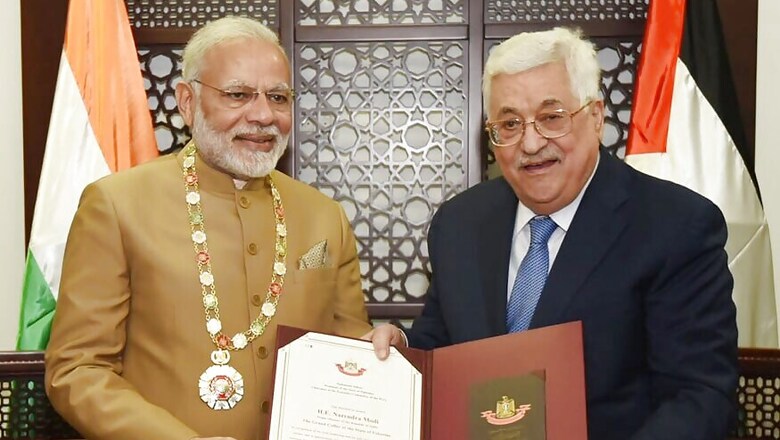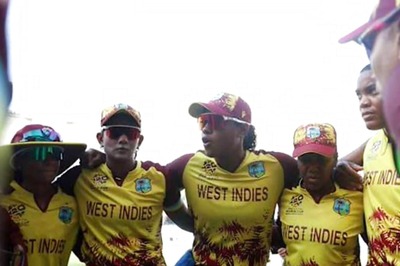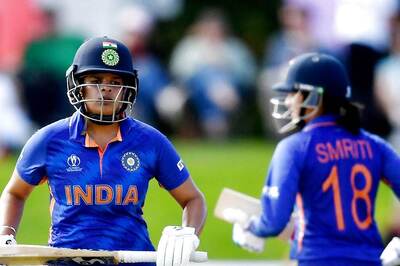
views
Ramallah (West Bank): Prime Minister Narendra Modi on Saturday batted for a sovereign and independent Palestine in his maiden visit to the country, also the first by an Indian Prime Minister.
"I have assured President Abbas that India is committed to the Palestinian people's interests," Modi said during a joint address.
He said India hopes for return of peace in this region. "We know that it's not easy, but we should keep striving because a lot is at stake," he said.
The two sides also signed agreements worth around USD 50 million that includes setting up of a USD 30 million super specialty hospital after Palestinian President Mahmoud Abbas received Prime Minister Modi in an official ceremony at the presidential compound, also known as Muqata'a, in Ramallah - the Palestinian seat of government.
On his part, President Abbas acknowledged that the Indian leadership has always stood by peace in Palestine. Abbas said Palestine is always ready to engage in negotiations to achieve its goal of an independent state. He asked India to facilitate the peace process with Israel.
"We rely on India's role as an international voice of great standing and weigh through its historical role in the Non-Aligned Movement and in all international forum and its increasingly growing power on the strategic and economic levels, in a way that is conducive to just and desired peace in our region," said President Abbas.
The two sides signed agreements worth USD 50 million. The agreement includes setting up of a super speciality hospital worth USD 30 million in Beit Sahur and construction of a centre for empowering women worth USD 5 million.
Three agreements in the education sector worth USD 5 million and for procurement of equipment and machinery for the National Printing Press in Ramallah were also signed.
President Abbas also conferred the 'Grand Collar of the State of Palestine' on Prime Minister Modi, recognising his key contribution to promote ties between India and Palestine.
The Grand Collar is the highest order given to foreign dignitaries - Kings, Heads of State/Government and persons of similar rank. Earlier, the two leaders exchanged hugs and stood for the national anthem of the two countries and then inspected the guard of honour before their bilateral talks.
Reached Palestine. This is a historic visit that will lead to stronger bilateral cooperation. pic.twitter.com/PpzN1JaBYO— Narendra Modi (@narendramodi) February 10, 2018
"We will discuss the recent updates with Prime Minister Modi, and the recent developments in the peace process, the bilateral relations, and the regional situations. And the possible role India can play in enhancing peace in the region, as well as discussing different economical aspects beyond the existing ties we already possess," Abbas had told PTI earlier.
Describing India as a "very respected country in the international arena", the 82-year-old had said that India can have a possible role in creating a multilateral forum of negotiations between the Palestinians and Israelis to reach a final agreement.
According to Abbas, Modi's visit to the region reflects India's long-held position of supporting peace and stability in the region.
During his maiden visit to Israel last year, Modi did not travel to Ramallah, the Palestinian seat of government. His standalone visit to Israel had led to many analysts questioning the future of the Indo-Palestine ties.
This time Modi skipped Israel in a clear message that India is de-hyphenating its ties with Israel and Palestine.
Modi's visit to Palestine comes amid heightened tensions in the region after US President Donald Trump recognised Jerusalem as the capital of Israel.
The unilateral US decision to declare Jerusalem as the capital of Israel was challenged at the UN General Assembly where 128 nations, including India, voted to turn down the move as "null and void".
Trump's decision to declare Jerusalem as Israel's capital angered the Palestinians, sparked protests in the Middle East and raised concern that it could further destabilise the region.
Though India has shied away from becoming a party in the Israel-Palestinian conflict, the Palestinian leader on several occasions has stressed on a possible role for New Delhi in the Middle East peace process.
India believes in a two-state solution in which both Israel and a future Palestinian state coexist peacefully.
The two-state solution envisions independent Israeli and Palestinian states coexisting side by side peacefully. The Palestinians see east Jerusalem as their future capital.
(With PTI inputs)















Comments
0 comment